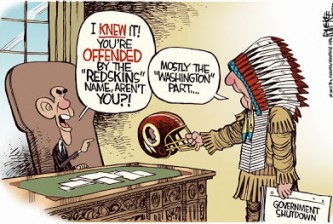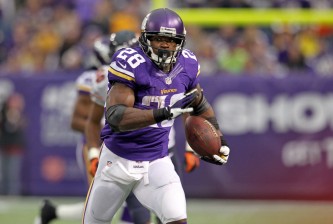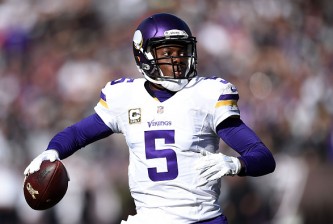
Two teams bludgeon their way through a mud- and blood-spattered season to face each other on the biggest stage in the world for one game, winner-take-all. The Super Bowl is, hands-down, the greatest single event in sports.
Except when it sucks.
We’ve been blessed in the last decade of parity with fantastic games, whether it was Tom Brady entering his own “The Drive” into the annals of Super Bowl history vs the Rams, or the unexpected fireworks between Kurt Warner’s Cardinals and Ben Roethlisberger’s Steelers, or Eli Manning’s Giants pulling of an upset every bit as big as Broadway Joe Namath’s Jets over the Colts. But the Super Bowl isn’t always so super. Here are the three worst championship matchups of all time.
3. A Giant Demolition: Super Bowl XXXV
2000: Baltimore Ravens 34, New York Giants 7
Yesterday, Matt Yoder brought us the greatest quarterback pairings in Super Bowl history. This game brought us one of the worst: Kerry Collins vs Trent Dilfer. Two lumps of anonymous meat fresh off the beer league fields that somehow got to dress up in NFL uniforms and invade our living rooms for four hours of brain-numbing awfulness.
All we ask for in a Super Bowl is some measure of greatness, and the Ravens had it — on defense. Ray Lewis was as fast and as dangerous as any defender to roam the championship turf, and the Giants’ incomprehensible game plan played right into his hands.
Coach Jim Fassel’s team tried to negate the Baltimore pass rush by keeping everything short, all but inviting Lewis into his kitchen. The Ravens routinely stacked 8, 9, and 10 men in the box, devouring Collins’ three-yard passes with a howl and a cackle. The Giants amassed only eleven first downs for the entire game (three coming via penalty), and their only score came on a fluke kick return.
As a side note: the Giants’ offensive coordinator that day was a young Sean Payton, who surely learned a few things about the dangers of keeping things conservative.
The Giants defense were no slouches, holding Baltimore to only 13 first downs, but they could not hold down the score as the Ravens used short field after short field to poach easy points and put this game well out of reach.
How bad was it? By the end of the game, Nielsen tracked 4 million fewer viewers than the previous year’s Rams-Titans thriller.
2. A Pirated Win: Super Bowl XXXVII
2002: Tampa Bay Buccaneers 48, Oakland Raiders 21
There was a lot to love in this game, if you grew up a die-hard fan of the Bucs like I did. If you didn’t … this was one of the biggest letdowns imaginable. The Raiders boasted the NFL’s best offense, architected by Jon Gruden, while the Buccaneers brought the league’s most aggressive defense, architected by Tony Dungy.
Except that Dungy had been shoved out of town, and Gruden had been traded out of Oakland in a fit of pique by Al Davis … and now stood on the Tampa Bay sideline.
Oakland’s offense was now coached by Gruden’s understudy Bill Callahan, who failed to change any of their terminology. During the Bucs’ pre-Super Bowl practices, Gruden taught his own offense to Warren Sapp, Derrick Brooks and the Buccaneers defense. He went so far as to stand in at quarterback and call out plays and then describe how they were supposed to be executed, completely unmasking his own concepts and eviscerating his former team.
This was the NFL equivalent of up-up-down-down-left-right-left-right-B-A-start. In the Raiders’ first 15 plays, they gained a total of 21 yards, and things didn’t get any better as the Buccaneers steadily built a 34-3 lead. The final score may not be the equal of history’s greatest blowouts, but 18 of the Raiders’ 21 points came in garbage time, long after most of America had turned this dud off.
1. The “Blunder Bowl”: Super Bowl V
1970: Baltimore Colts 16, Dallas Cowboys 13
The Super Bowl was originally envisioned as a means of crowning a true champion between the NFL and the rival AFL. While Vince Lombardi’s Packers established the dominance of the NFL in the first two games, Don Shula’s Baltimore Colts were the first team to stumble, losing to the Jets in Super Bowl III. Shula was soon relieved of his duties, and two years later a new coach – Don McCafferty – had taken the Colts back to the hallowed ground.
The championship game had lost a little luster after a sloppy, poorly played Minnesota performance raised a cloud over Super Bowl IV. Moreover, the AFL and NFL merged in 1970, throwing traditional rivalries into disarray. Indeed, this game matched up two members of the original NFL.
That would have been fine if they had been good. But they weren’t.
The teams combined for eleven turnovers, fourth-most in NFL history, with Baltimore contributing five fumbles (four lost) and three interceptions. It was one of the ugliest combined offensive days you could imagine, and it happened with everyone watching.
By this point in his career at age 37, Baltimore’s Johnny Unitas was riding on the fumes of his own legend. He barely completed half of his passes in the regular season, and threw 20 INTs against only 12 touchdowns. He was worse than that in the big game itself, completing only three of nine passes with two picks. One of his three completions was a twice-tipped ball that tight end John Mackey caught and ran away with for a 75-yard touchdown, the day’s one offensive highlight (and one whose legality the Cowboys vigorously protested).
The Cowboys’ quarterback was little better, as Sports Illustrated’s Tex Maule wrote:
No one has ever accused Craig Morton of being a great quarterback, and after this game it is unlikely that anyone ever will. He completed 12 of his 26 passes—most of them short ones—but he also threw three interceptions and missed open receivers repeatedly, “it was a great challenge,” he said sadly after the game.
This snoozer failed to create a 100-yard rusher or receiver for either team, little of note except for its own outstanding ugliness. Whoever said winning ugly could be beautiful must have been a Colts fan. Or a Bucs fan. Or a Ravens fan.
—
Just missing the cut: The 1985 Patriots’ hapless loss to the Shufflin’ Crew, the Bills’ third and fourth Super Bowl losses, and the execrable in its own right Super Bowl IV.






















